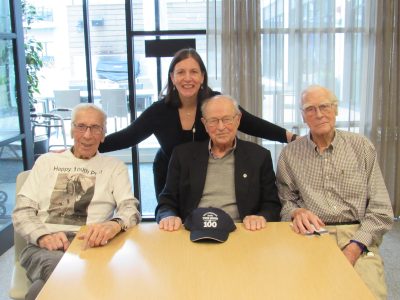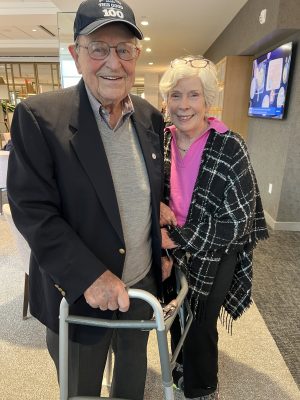Three Centenarians Look Back at Their Lives While Enjoying Today
News Based on facts, either observed and verified directly by the reporter, or reported and verified from knowledgeable sources.

If you’re over 100 years old, remembering key moments in your life acknowledges who you are and how you see the world.
For three centenarian gentlemen, their sharp recall of pivotal moments plays like a temporal telescope with a focus of meticulous clarity.
As residents of Waterstone of Westchester, a senior living community in White Plains, all three gathered last week to share their life stories with The Examiner.
Alex Forger, tall and soft-spoken, turned 101 on Feb. 19; Phil Potash, wearing a “Happy 100th Phil” sweatshirt with an old photo of him playing golf, turned 100 on Feb. 7; and Kurt Goldschmidt, wearing a hat with the message “Not Everyone Looks This Good at 100,” turns 101 this Saturday, Mar. 30.
Being able to joke about intermittent hearing aids, snitching chocolate or the frustration of texting on their cell phones, their memory of years, dates and events shatters the myths on which ageism is based and reclaims deserved respect for elders seen generations ago.
A connective thread for all three men is World War II.
Goldschmidt is a Holocaust survivor, Forger fought in the Battle of the Bulge and Potash was stationed stateside in the Army.
Goldschmidt was a Jewish teenager living in Hamburg with his family when the Nazis shuttered his father’s three businesses.
“We lived very well until 1933 when Hitler came to power,” Goldschmidt recalled. “In 1935 he ordered the boycott of Jewish stores. We hardly had anything left. In 1943 Hamburg was bombed and the whole area was completely destroyed. We lived in bombed-out buildings.”
Goldschmidt, whose mother was Christian (although she converted to Judaism), was sent to various Nazi-run facilities to build war materials. Eventually he was transported to Theresienstadt, a Nazi-controlled ghetto that transported Jews to Auschwitz. Goldschmidt remained there until Soviet forces liberated Theresienstadt in May 1945.
Forger, a U.S. Army infantry sergeant, served for three years at the same time Goldschmidt was in Theresienstadt. He was a machine-gunner and earned a Bronze Star.
“That’s when I was in the war of the Bulge,” Forger told Goldschmidt. “That was the turning point. I crossed the Rhine in March 79 years ago on the way to Berlin. I lost all my squad. You and I could have met in Germany when I was there in 1944 in the Army’s Sixth Combat infantry with a machine gun shooting Germans.”
Throughout his career as an attorney, Forger advocated for fighting discrimination and prejudice. He recalled being in battle where differences among soldiers were irrelevant.
“When you get into combat, where life depends on the person next to you, you understand, as Martin Luther King Jr. said, the content of their character was more important than their color, their religion, the way they spoke or where they came from,” he said. “You judge people on who they are, not what they looked like. We’re still trying to cope with that.”
Potash said he volunteered for the Air Force but was turned down and ended up in the Army. He never left the U.S., which filled him with mixed emotions. Potash’s brother was in the Field Artillery Battalion in Normandy.
Greater lifespans give new meaning to longevity, and having three men living at the same address who’ve all reached 100 defies statistical odds. According to the Pew Research Center, for 2024 in the U.S. just 22 percent of centenarians are men. In 30 years, that number for men is expected to reach 32 percent.
“It’s really remarkable that these three 100-year-old-plus men are all living in one small community, and they are all physically and mentally active,’’ said Madelyn Silverstein, life enrichment director at Waterstone of Westchester. “They are really engaging and amazingly active.’’
After the war, each embarked on their professions or owned businesses and started their families. Each man spoke of his career and family and how they viewed social and cultural changes over the decades.

Potash grew up on Long Island and was thinking of a career in chemical engineering while attending Brooklyn Tech High School. He eventually had a successful career in the garment industry. The dramatic change in clothing came in the 1960s and ‘70s with the popularity of jeans for women, Potash said. He had his own business cutting fabric, sewing and selling clothes for the entire family.
“Jeans was the end of wearing dresses and skirts, and I thought jeans would be a passing fad,” he said. “It’s only now that dresses and skirts are coming back.”
The industry also saw shifts, particularly regarding ownership, which was mostly Jewish, to countries such as Mexico and China, producing clothes that were sold for much lower prices, Potash noted.
“If you have nobody who will eat or use your product, it doesn’t matter what you make.”
Forger became a prominent trust and estates attorney for several decades and was a managing partner with Millbank Tweed, the famous New York City-based international law firm. The Princeton and Yale Law School graduate recalled the inequality between men and women and people of color back then.
“There was one woman in my law school class out of 150 people, and when I went to work at a major law firm, they apologized for having only two women on staff out of 75 lawyers who were white Anglo-Saxon Protestants. It’s taken a long time but life has changed a great deal. There is still ample discrimination.”
By the time Forger left Milbank Tweed in 1993 he said the firm had women, Black, openly gay partners and those of all religions. He specifically went to Howard University, the historically Black university in Washington, D.C., to recruit people for positions.
“As lawyers we were interested in people not with things or corporations,” he said.
Forger has lived at Waterstone for almost two years. He still works on certain tax and fiduciary accounts and is writing about people he meets at Waterstone.
“Here they try to keep us all occupied with learning, listening, participating, acting and visiting. They do it all. This is a place where you can be as active as you want and as quiet as you want,” Forger said.
Goldschmidt and his wife came to the U.S. in 1948, and settled in Washington Heights in Manhattan, which was then a predominantly German neighborhood known as Frankfurt on the Hudson. His wife was a dressmaker who had success making high-priced dresses that sold in shops on Madison Avenue. Goldschmidt held a few part-time jobs, including as a dishwasher and assistant at the famous furniture designer Russel Wright before earning his undergraduate and master’s degrees. He became a New York City social worker for 21 years, then changed careers, and owned a travel agency in Bayside, Queens for 50 years.
Having moved to the Waterstone last December, Goldschmidt said he enjoys scheduled outings such as the live musical production of “Into the Woods” performed at Rye Country Day School.
Goldschmidt’s daily routine starts with breakfast in the dining room.
“But I make my own lunch, read periodicals and then there’s a cocktail party before dinner,” he said.
It was at breakfast seven weeks ago that Goldschmidt met Sandra Godfrey, a fellow resident with a pleasant smile.
“Sandy is my new girlfriend,” Goldschmidt said with a twinkle in his eye.
Goldschmidt finds people in the U.S. are largely the same since he arrived.
“I think the attitude of people towards others have not changed,” he said. “Maybe they are even friendlier and outgoing in how they help people.”
Potash has lived at Waterstone for the last two years. He said he likes his routine, and although he misses his car and greater independence, he is fine to mostly relax.
“I’ve done a million things in my life and now I’m here to do nothing. I have my meals, read books, watch ‘Jeopardy!’ and the ball games. Helping my wife raise my two daughters is the best thing that happened in my life. My daughters come here, we go to (Bloomingdale’s) for lunch and I do my shopping online. It’s a small world now. Everything is available by this,” he said, holding up his cell phone.
Potash said he has seen tremendous advancement in broadcast media and communication, upgrades in cars and the ease in managing finances.
“But people are the same,” he said. “People don’t change, they have their domestic problems, medical problems, although treatments may have gotten better. But life has been the same since the day you were born. Because you get older doesn’t mean that your mind or attitude changes.”
All agreed that life is much better for seniors today than it used to be.
“We have Social Security, Medicare, better financing and schooling,” Forger commented. “What’s changed in the last 20 years is technology, which seems to be best for the world. We know about what’s going on, we know it instantly, but it doesn’t always lead us to morality and truths.”
Forger, Goldschmidt and Potash are able to exchange years and places of their past, which seems to have propelled them into a new comradery. And although they have all have lost their wives and other loved ones, they continue to keep living taking one day at a time.

Abby is a seasoned journalist who has been covering news and feature stories in the region for decades. Since The Examiner’s launch in 2007, she has reported extensively on a broad range of community issues. Read more from Abby’s editor-author bio here. Read Abbys’s archived work here: https://www.theexaminernews.com/author/ab-lub2019/
